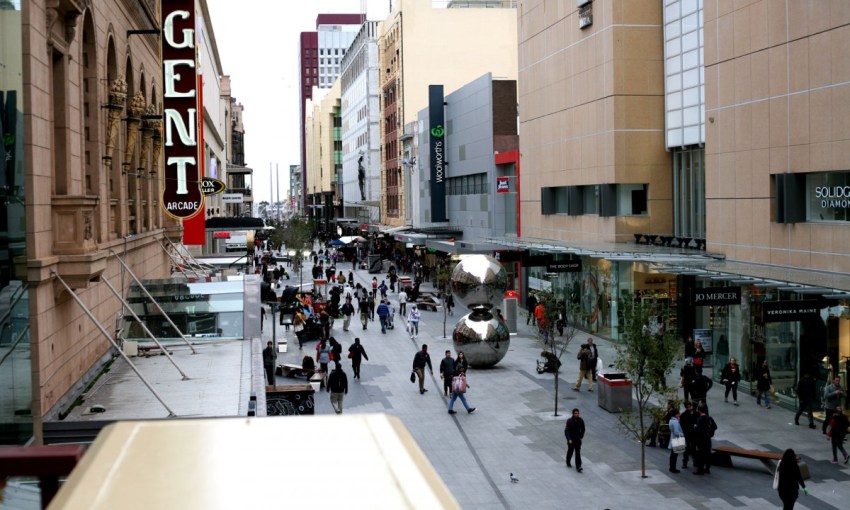From a new sound system in Rundle Mall, to expanding paid car parking, to exploring the possibility of a live performance “sound shell” – here are some of the projects the city may pay to investigate or implement over the next financial year.
Dissecting the city’s embryonic draft business plan and budget
At an Adelaide City Council committee meeting – held virtually as the Lord Mayor Sandy Verschoor has contracted COVID-19 – on Tuesday night elected members were provided the first outline of the city’s 2022-2023 draft business plan and budget.
In the early-stage discussions, strategic project spending was recommended to be a maximum of $5.4 million.
Suitable projects detailed in a draft budget report prepared by the administration were categorised as to whether they’re “business-critical”, part of the Reignite Program designed to bring people back to the city, council-adopted initiatives, and so on.
“This list for this workshop are not final in terms of what we’ll be putting into the draft business plan,” City of Adelaide finance and procurement manager Grace Pelle said this week.
“The idea was to bring you the list as they stood, so you could see how they’ve been formulated and obviously seek any feedback from councillors tonight.”
New here? Sign up to receive the latest happenings from around our city, sent every Thursday afternoon.
Some of the more expensive recommended draft projects for the next financial year include $710,000 for the Splash Adelaide city activation; $605,000 for implementing climate risk infrastructure exposure actions; $597,000 for the Adelaide Free Wi-Fi upgrade; and $341,000 for the 2022 general local government elections.
Less expensive but notable recommended draft projects include $40,000 for elected member training and $120,000 to increase voter turnout and “candidate diversity” for the Adelaide City Council elections.
A City of Adelaide spokesperson said the budget for elected member training for the 2021-2022 financial year was $15,000, with $5000 allocated specifically to the Lord Mayor.
The cost increase in the next financial year is due to the new councillors expected after the November local government elections.
The administration recommended spending $30,000 over 2022-2023 on South Australian homelessness sector reforms and the Adelaide Zero Project – with the same amount allocated to review Adelaide Oval’s event parking.
The City of Adelaide did not answer CityMag’s questions before deadline regarding how much funding was allocated in the last financial year to the Adelaide Zero Project and homelessness services.
Parking was mentioned numerous times in the report, with $40,000 recommended to be spent on the “carbon neutral UPark project” and an expansion of paid parking zones costing $300,000 from the council’s capital budget.
Project opportunities included exploring the feasibility for a city “live site” and live performance “sound shell” with prices to be confirmed at a later date.

An example of a sound shell, located in New South Wales. This picture: Mattinbgn
The report includes works-in-progress with costings spanning over the 2022-2023 financial year, including finding a new home for the South West Community Centre with $1.5 million in capital funding, and the same amount allocated to complete the long-stalled north-south bikeway.
Other noteworthy project opportunities include upgrading the basketball court and skate park at Ityamai-Itpina King Rodney Park with $250,000 in capital funding, and $110,000 to investigate the expanded use of recycled water to irrigate streetscapes.
Despite the council last December asking SA Police to consider a “formal undertaking” to not use facial recognition technology “unless and until” the South Australian Parliament adopts legislation consistent with Australian Human Rights Commission and Law Council recommendations, CCTV cameras have been budgeted to cost $100,000.
Representatives from the city council’s direct subsidiaries – the Adelaide Central Market Authority (ACMA) and the Adelaide Economic Development Agency (AEDA) – also offered deputations on Tuesday night regarding their respective 2022-2023 strategic plan and budgets.
ACMA’s notable take-aways include rent escalations at 2 per cent, expanding click-and-collect services, and $750,000 recommended spending to upgrade market floor stalls.
The authority wants to lower business operating costs and wastage and improve the “stall atmosphere”, their report says. The overall thrust over the next financial year is to “create enduring customer connection as the world’s leading food and produce market”.
AEDA, which replaced the Rundle Mall Management Authority in January 2021, says in its plans it wants to “accelerate growth” in the city by attracting investment and supporting business.
Their 2022-2023 planned actions include delivering on the KPMG Performance Review recommendations, engaging with Renew Adelaide to activate “retail vacancies” and advocating for a Rundle Mall sound system upgrade.
The draft business plan and budget will go out to public consultation next month, with the council adopting final plans in June.
For more Adelaide City Council news, head here.




